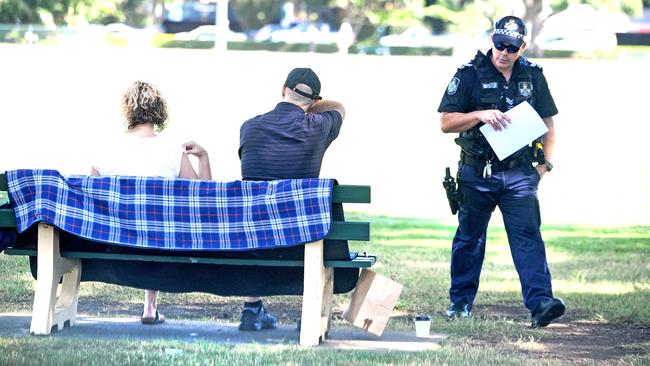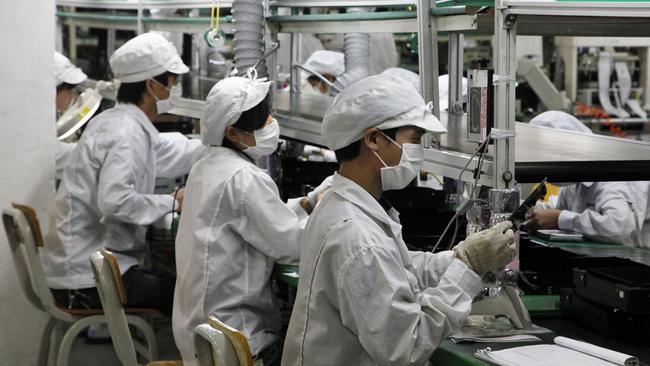Restraints put on many activities in Queensland are over the top
The current restraints put on many activities in Queensland are over the top.

Opinion
Don't miss out on the headlines from Opinion. Followed categories will be added to My News.
DES Houghton raises an important point about whether some COVID-19 restrictions may be “trashing civil liberties of ordinary people posing no threat to others’’ (C–M, April 11).
The key is to examine the threat level. Where is the threat if social distancing is maintained?
This question also raises the issue of consistency. What is the point of social distancing outside a supermarket if this is abandoned inside with shoppers cramming into each other in shopping aisles?
There is also inconsistency between States about the prohibition on going to a family beach home or a similar residence in the country. If social distancing is maintained at these places, where is the threat?
The other curious thing is that sunbathing on a beach is prohibited even if you are the only one there.
A proper risk assessment ought to be made of all restrictions to make sure there is no overreach against personal liberty which poses no threat to public health.
As always social distancing and personal hygiene remain paramount in the war against the pandemic.
David Muir, Indooroopilly
WELL said Des Houghton (C–M, Apr 11).
The current restraints put on many activities in Queensland are over the top. Activities such as golf have been made to look as dangerous as shopping in supermarkets which I think brings people close together, no matter how they line them up outside.
For example, fruit is touched by customers as they move from one item to the next.
And swimming is banned altogether both at beaches and pools.
It’s time to loosen up Queensland.
Stephen Kazoullis, South Brisbane
THERE is much common sense in Des Houghton’s column “Tyranny in big stick distancing” (C–M, Apr 11).
Why is it so common that common sense emanates more from those outside the circles of authoritarian decision-making than from those within?
One of the stated rights is freedom of movement, not that any of the stated rights is truly a right in that the stated rights can be limited by other properly made laws. The latter include orders made by the chief health officer under the Public Health Act.
The fact that the public health orders issued in relation to COVID-19 usually state words to the effect that “the issuer reasonably believes the order is necessary” does not mean the order actually does restrict rights only to reasonable and demonstratively justifiable limits.
As Houghton suggests, if the people do not believe the restrictions are justified, they will bring the Government to heel and force it to limit its restrictions to what is demonstrably justified and lawful. It is only prudent that authorities should exercise common sense.
Ross Drynan, Innisplain
IT’S great to see that people are taking seriously the message to stay home.
It does concern me though that we are still being told by the Premier and the Health Minister that these measures may last six more months.
People are struggling mentally with the fear factor as we keep getting bombarded with negative stories via the media.
The constant lecturing and threat of the curtailment of more freedoms is not helping.
We need to have some hope that what we are doing will get us out of this sooner than six months, otherwise people will start asking what the point is and start ignoring the directions.
At the moment we are being told that we could be here for six months even though numbers of cases continue to fall.
There are several aspects of these draconian measures I struggle with. I fail to see how sitting on the beach is going to spread the virus. I fail to see how going for a drive with my wife is going to spread the virus. I fail to see how walking in our national parks will spread the virus.
All of the above will actually benefit people’s ability mentally to cope with the lockdowns.
It seems as though instead of dealing harshly with the few people who don’t follow guidelines, we are punishing 99.5 per cent of the community who do the right thing.
As several columnists have pointed out, Australians have obeyed the massive curtailment of their freedom very well but that goodwill will not last if we aren’t given some hope of a way out sooner rather than later.
Des Deighton, Coolum Beach
I CANNOT understand why every Queenslander must abide by the exact same pandemic restriction, whether living in Brisbane (population 2.4 million), Gympie (25,000) or Quilpie (595).
Statistically, without even considering the disparity in population density, a Brisbane resident is one hundred times more likely to contract coronavirus than a person living in Gympie.
Closing Gympie schools, churches, pubs, clubs, playgrounds, sports venues, etc, is, I believe, unnecessary and disruptive and extremely damaging to the local economy, both now and in the long term.
And fining a driver $1300 for taking a short joy ride is beyond draconian.
Smaller towns, virtually untouched by this virus, should be allowed to stay open for business. There are those who will say “we can never be too careful’’ and “better to be safe than sorry’’.
But imagine what our lives would be like if we rigidly applied this philosophy to everything we did.
Life wouldn’t be worth living.
Denis Twomey, Gympie
BIT OF A STRETCH
I REFER TO the story “Nice one Qld: it’s working’’ (C–M, Apr 11).
Either the Health Minister Steven Miles is stretching the truth by stating the peak could arrive in six months or “could even be later’’, or the peak could be much smaller than 250,000.
At the present infection rate of about 12 per day it would take 54 years to reach that number. To get that many infections in six months requires a daily infection rate of almost 1300.
Ian Wilson, Chapel Hill
PROCEDURES WORKING
IT is gratifying to see the COVID-19 infection rate in Queensland coming down so well and close to leading the way among the Australian states (C–M, Apr 11).
Certainly there is no evidence of a spike after the council elections and State by-elections only two weeks ago.
The safety procedures appear to have been effective.
Perhaps the naysayers protesting against holding the elections instead helped focus increased public attention on the advice provided by the State Government and Chief Health Officer Dr Jeannette Young, resulting in improved compliance both during the elections and afterwards until the present.
Donald Maclean, Fig Tree Pocket
ANKLE BRACELETS
INSTEAD of fining people, why not get them to wear ankle bracelets and monitor them and take action such as a night or two in jail. Problem solved.
Peter Kolb, Redcliffe
CAUTION REQUIRED
IT seems complacency and an unrealistic expectation of optimism is creeping in relation to stamping out of the coronavirus going by some stories, including the reaction by Flight Centre boss, and the NRL announcing the date for recommencement of the competition (C–M, April 11).
My question would be where are they receiving their information from that would lead them to conclude that it is safe to ignore the social distancing laws? Statistics from overseas show horrible infection and death rates and no guarantee that ours will not reach those heights.
However, the Government with medical advice has given Australians a fighting chance if all procedures of the restrictions are adhered to.
Calm is still the order of the day.
Susan McLochlan, Caboolture South
ON THE LIGHTER SIDE
WE have to maintain social distancing. Does that mean the birthrate in January next year will be down?
Marcus Titley, Taringa

LACK OF PRIDE A SAD REALITY
THERE is much talk about what will happen after the pandemic, the way Australia will be different.
How we will be less reliant on other countries, especially China. There are calls to not buy Chinese products and to make them ourselves. How? We have very little manufacturing capacity left. What we have is generally owned by multinationals.
We export our cattle and sheep. We export our ore. Investment in this country now means foreign money buying our industries, real estate and agriculture. We don’t have the money to start up new businesses or retool existing ones.
Our governments really don’t care, no matter what party. They all subscribe to the global economy. When given the chance, often governments opt for offshore purchase and manufacture.
With the debt that will come out of this crisis, we as a country will be in no position to invest in ourselves.
This not new. We have let it happen, even welcomed it. Now even our call centres are manned by people whose first language is not English.
We rejected buying Australian in favour of cheapness. We have universities beholden to foreign students.
Where is the pride, the mateship, the loyalty. Gone to greed and we are all responsible.
Once this crisis is over, we will go back to be the lazy, greedy people we were before it.
Ross Clark, Woody Point


